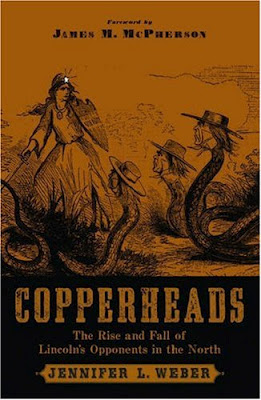About a year or so ago I saw an episode of History Detectives on PBS where they were trying to find out some information on a walking cane that had a coiled copperhead snake handle. They were able to confirm that it belonged to a vehement Copperhead politician named Henry Clay Dean from Iowa. They even found a reference to the cane in a newspaper article. Naturally, I have often read about Copperheads in general Civil War history books, but I had not read a thorough account of them until I read Jennifer Weber's Copperheads: The Rise and Fall of Lincoln's Opponents in the North.
If you're not familiar with the Copperhead movement during the Civil War, they were basically conservative anti-war Democrats that wished to have (as a slogan some used) "the Constitution as it is, the Union as it was," which meant they believed in a strict interpretation of the Constitution and a compromise on the slavery issue. The name "Copperhead" came from some members who wore a penny on their lapel to designate themselves. Some of these Peace Democrats also went by the name "Butternuts," especially those in the lower Midwest. The Copperheads were vehemently opposed to infringements of civil liberties, despised a powerful federal government, defended states' rights and thought emancipation was a dangerous and ill-advised idea. In an era where most whites displayed racist tendencies, the Copperheads were especially so.
Weber's book contends that the Copperhead movement developed in three phases. The first was with secession and what they thought was Lincoln's overstep of his constitutional powers. The second phase was with the preliminary Emancipation Proclamation and then the draft. The final phase was in the summer of 1864 with the large loss of life the Union army experienced as it tried to destroy the Confederate armies and which was not well received in the North.
Copperheads explores a number of the leading men, most from the Midwest, that led the movement. Chief among these was Ohio congressman Clement Vallandigham. Vallandigham's vehement outbursts in print and in speech were not appreciated by the Lincoln administration. The Ohioan was promptly arrested and sent across the lines into Confederate territory in Tennessee in 1863. He made his way to Richmond then the Caribbean and finally to Canada where she stayed much of the rest of the war and ran for governor of Ohio in exile. He lost.
One aspect of the book I found quite intriguing was the author's look at how Union soldiers perceived the Copperheads. Being that the Copperheads opposed the war effort one can image what the soldiers out doing the fighting and dying thought about them. Weber shows with a number of primary source letters how Union soldiers wished they could get their hands on those that fought against the war effort from behind their own lines and on the home front. The soldiers showed their support for the war and disdain for the Copperheads and the Peace Democrats by voting overwhelmingly for Lincoln in the fall of 1864. Most Northern soldiers believed their sacrifices would be in vain if they did not see the war to its conclusion.
Weber too points out wisely that the Copperheads never really offered any substantial alternatives to Lincoln's policies. They only attempted to harangue and obstruct the administration that understood too much sacrifice had been made to compromise with the South on reunification and emancipation. The Copperheads also seemingly ignored the South's constant refusal to consider a peace without their independence and slavery firmly secured.
I do wish that Weber would have provided more coverage about how the Copperheads hurt the Democratic party's chances for regaining political power in the post Civil War years. The political clout of former soldier organizations such as the Grand Army of the Republic and their Republican Party connections surely must have severely damaged the Democratic party - even those Democrats that supported the Union war effort - for years.
Copperheads was very informative and well written. I think it is important to understand the potential power the Peace Democrats had, especially in certain regions, and how they could have altered events significantly if it had not been for the Union army successes in the late summer and early fall of 1864. On a scale of 1 to 5, I give Copperheads a 4.5.

No comments:
Post a Comment